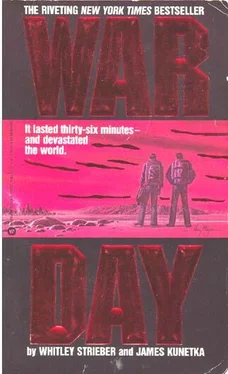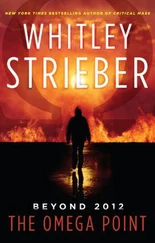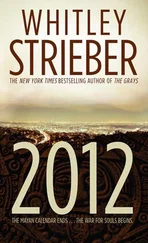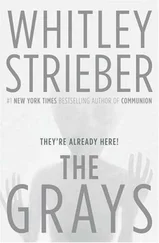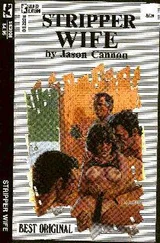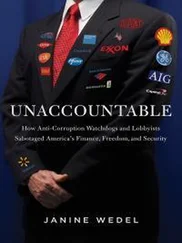Morgan Moore didn’t talk much about his present project, but I must say that the dismantling of the World Trade Center is a work of tremendous energy and vision. Everything is being done on a gigantic scale. Massive devices pull wiring out onto huge wheels, drawing it like the meat from a crab claw. Dozens of scaffolds hang down from the towers, with men on them loosening sheathing while others work with cranes, taking the plates to the ground.
Inside the buildings, window crews dismantle the good glass, floor crews take up usable wood and linoleum, decoration crews remove furniture. Behind all this, Morgan Moore sits in his command trailer, manipulating a sophisticated new Toshiba computer and talking to his people over an elaborate communications system.
I went as far as the thirtieth story in the elevator that they have rigged along the side of the South Tower. From there I saw the whole of New York Harbor, from the Verrazano-Narrows Bridge between Staten Island and the black ruins of Brooklyn to the Statue of Liberty. I could see the arm and torch lying at the base of the great statue. Even if New York remains uninhabited, that statue ought to be restored—even moved, maybe to Philadelphia.
Moore has twelve workmen, all paid in gold on the basis of the market value of their salvage. Some of these men, skilled wire-pullers for example, can make the extraordinary salary of ten gold dollars a week.
But I could not love Morgan Moore’s salvage operation. I could only think of the city before the war, with the sun on its towers and the throngs in its streets. It was a great work of art, New York, made up of millions of sophisticated, convoluted lives.
I find that I cannot really say much about it. It was Whitley’s home, and fortunately writing about it has been his responsibility.
Instead, I am going to turn to other events that occurred toward the end of our journey.
We were unable to arrange a flyover of Washington. The Army refused without giving a reason. I think maybe the military is ashamed of losing the capital city.
Our money was nearly gone, which didn’t matter much, since we couldn’t leave the train once we crossed the Mason–Dixon line and entered the South, an area of the country almost as economically healthy as California. As long as one stays in the through-car there’s no problem, so we watched Virginia and Tennessee pass by the window. We had neither the funds nor the emotional energy to do a repetition of California and become fugitives.
Watching the towns go by, the flash of a main street or a town square, big, leafy trees, kids waving from the backs of horses, I felt something I have never felt before, that under the circumstances was rather curious. I did not feel alienated at all, even though I could not walk freely down those streets, nor even set foot on this soil. I guess I understood. They can’t afford too many immigrants. There have to be controls. I hope that what I felt never leaves me. It was a closeness to my fellow human beings, as if the very concept of the stranger were false. As if the borders, the restrictions, all were also false.
We belong to one another; in a sense we are married one to all.
Before the catastrophe we had failed to notice this. But we all have as much of a stake in everybody else as we have in ourselves.
The thought of this great marriage brings me down to a much smaller one. Perhaps if Quinn Yarbro doesn’t find Vivian, I will create some kind of a monument for her. A monument for one person still makes sense, I think, if she was your person.
In my mind I am trying to assemble the elements of my journey into some whole image: the people, their voices and faces and stories; the landscapes; the documents; my perceptions and what I feel about all of it.
The vision that remains of the journey is complex. It is a great mass of haunting images, of suffering and work, of people who keep on even when they ought to be unable.
I was affected by smiles. Before the war there were never such smiles. They can shatter you, the smiles of the Americans.
I listen to the rattle of the train. Beside me, Whitley rests from working on his own notebook. His head lolls onto the seat.
I realize that a radio is playing.
A radio?
Well, there are a lot more of them around these days than there were even a couple of months ago.
The music is soft, repetitive, peaceful. Typical popular music. I know the album: Brian Eno’s Persistence of Vision.
I close my eyes. For a while, I’ll sleep also. May my dreams be peaceful.
The kids ran into trouble at the patrol station three miles across the Georgia border.
People in through-cars aren’t supposed to get out in restricted-immigration states, but a restless murmur went among us when we saw them being herded off the train and into holding pens.
The Georgia Patrol wears green. They look like park rangers, not at all terrifying like the California Immigration Police. But they herded a thousand children into a fenced enclosure suitable for perhaps three hundred. They crowded them there in the blazing sun, the ten supervisors among them. A tall black man stood just inside the gate, clutching a sheaf of papers. We could see his mouth moving as he obviously tried to reason with the patrol officers.
“This is outrageous,” a woman said.
A man went to the door of the car. “What’s going on?”
He was ignored.
Jim got up. He took out his Herald News identification and strode out onto the platform. Most of the other passengers followed him, myself included.
“I’m a reporter,” Jim said, flashing his papers. “Can I see the commanding officer, please?” The patrolman to whom he spoke shook his head, but in disgust, not refusal.
“Just what we need,” he said. “Do you travel with ’em or what?”
“I think the press has a right to know what’s going on here. These kids are bound for Alabama. Why are you taking them off the train?”
Another patrolman came over. His underarms were wet. He was haggard, his face covered with sweat. “I’m Captain Howell,” he said. “These children are not bound for Alabama. They’re going back to Pennsylvania.”
“The hell they are, Bob Howell,” a man’s voice boomed out. We all turned to see a stocky gentleman in a cream-colored suit coming down off the Georgia car.
“Lord, if it isn’t T.K. What the hell are you doin’ all the way up here in Toccoa?”
“I just come from a meetin’ of the Southeast Funeral Directors in Greensboro. Look here, Bob, I want to know what’s goin’ on. You can’t just herd them kids into that hot corral. You’ll have some dead babies on your hands, man.”
“They can’t go any farther. We got a bulletin from Alabama about them. They haven’t got room for them down there.”
“We’ve got papers,” the leader called from the enclosure. “We’ve got all the authorizations we need.”
“What he has is a permit from Pennsylvania. The Northeastern states send these kids down here without so much as a by-your-leave. They figure we won’t turn away a bunch of helpless orphans. You know how many of these kids have come down this one rail line in the past six months? Eighteen thousand and change. We can’t handle ’em, T.K. We’ve got to send ’em back.”
The children, I noticed, were scarcely aware of the drama on the platform. They were going about making their new place as endurable as they could, tying blankets to the fencing to create sun shades. The babies and the little ones were kept in the shaded areas, watched over by the supervisors and the older kids.
The woman we had talked to on the train came to the edge of the enclosure. “We’re going to need water and milk,” she called.
Читать дальше
